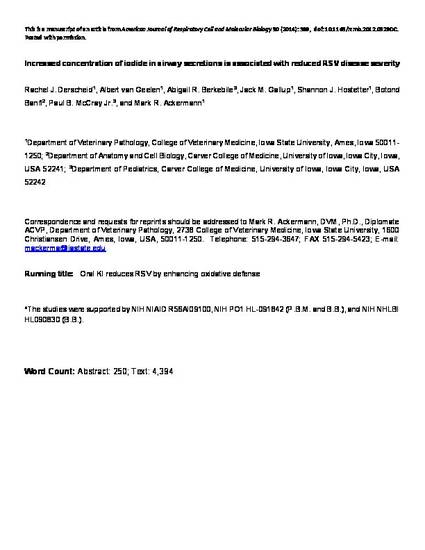
Article
Increased Concentration of Iodide in Airway Secretions is Associated with Reduced RSV Disease Severity
American Journal of Respiratory Cell and Molecular Biology
Document Type
Article
Publication Version
Submitted Manuscript
Publication Date
2-1-2014
DOI
10.1165/rcmb.2012-0529OC
Abstract
Recent studies have revealed that the human and nonrodent mammalian airway mucosa contains an oxidative host defense system. This three-component system consists of the hydrogen peroxide (H2O2)-producing enzymes dual oxidase (Duox)1 and Duox2, thiocyanate (SCN−), and secreted lactoperoxidase (LPO). The LPO-catalyzed reaction between H2O2 and SCN− yields the bactericidal hypothiocyanite (OSCN−) in airway surface liquid (ASL). Although SCN− is the physiological substrate of LPO, the Duox/LPO/halide system can generate hypoiodous acid when the iodide (I−) concentration is elevated in ASL. Because hypoiodous acid, but not OSCN−, inactivates respiratory syncytial virus (RSV) in cell culture, we used a lamb model of RSV to test whether potassium iodide (KI) could enhance this system in vivo. Newborn lambs received KI by intragastric gavage or were left untreated before intratracheal inoculation of RSV. KI treatment led to a 10-fold increase in ASL I− concentration, and this I− concentration was approximately 30-fold higher than that measured in the serum. Also, expiratory effort, gross lung lesions, and pulmonary expression of an RSV antigen and IL-8 were reduced in the KI-treated lambs as compared with nontreated control lambs. Inhibition of LPO activity significantly increased lesions, RSV mRNA, and antigen. Similar experiments in 3-week-old lambs demonstrated that KI administration was associated with reduced gross lesions, decreased RSV titers in bronchoalveolar lavage fluid, and reduced RSV antigen expression. Overall, these data indicate that high-dose KI supplementation can be used in vivo to lessen the severity of RSV infections, potentially through the augmentation of mucosal oxidative defenses.
Copyright Owner
Rachel J. Derscheid, et al.
Copyright Date
2014
Language
en
File Format
application/pdf
Citation Information
Rachel J. Derscheid, Albert G. van Geelen, Abigail R. Berkebile, Jack M. Gallup, et al.. "Increased Concentration of Iodide in Airway Secretions is Associated with Reduced RSV Disease Severity" American Journal of Respiratory Cell and Molecular Biology Vol. 50 Iss. 2 (2014) p. 389 - 397 Available at: http://works.bepress.com/jack_gallup/9/

This is a manuscript of an article from American Journal of Respiratory Cell and Molecular Biology 50 (2014): 389, doi:10.1165/rcmb.2012.0529OC. Posted with permission.